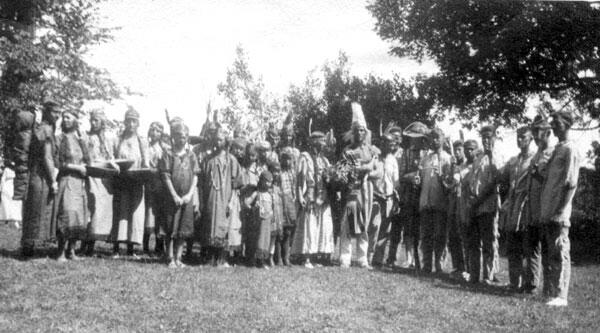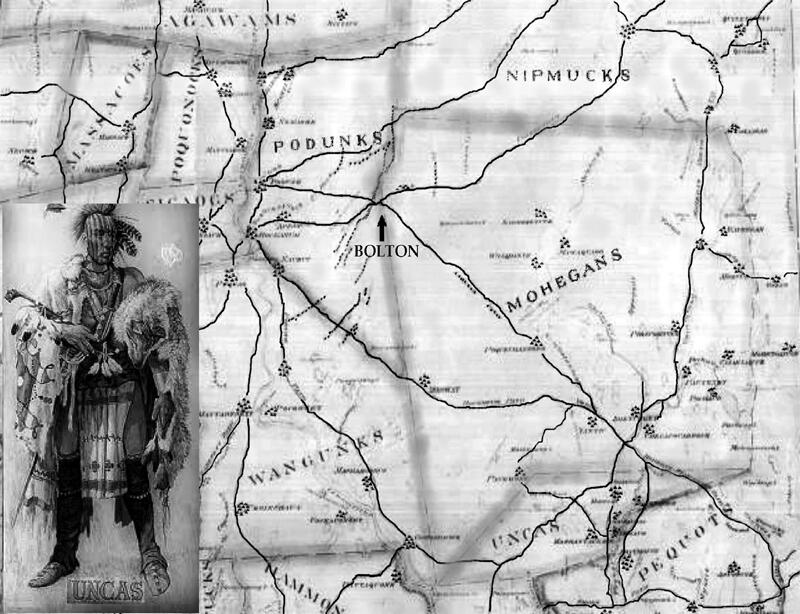by Hans DePold, town historian
(Published in the Bolton Community News, June 2008)
Uncas was indeed the embodiment of the wise sachem (chieftain) that James Fenimore Cooper described in his book, "The Last of the Mohicans." But unlike Cooper's sachem, Uncas did not live in the 18th century in upstate New York; he lived right here in the Thames River basin in the 17th century. And Uncas was not the last Mohegan—he was the first.
The success of Uncas and the Mohegan tribe led to great change in the region's power structure. With the help of the Mohegans, the English triumphed against the Dutch and Connecticut was at peace from Indian wars. The Mohegan tribe became the unrivalled native power during colonial times. And Uncas was responsible for the Mohegans surviving as a sovereign nation. He played a major part of Bolton's heritage and is a symbol of the very best of our Native American heritage. Thanks in part to Uncas, the four essential virtues of Native American spirituality survived: respect for a Supreme Being, respect for Mother Earth, respect for one's fellow man, and respect for individual freedom.
A British writer named Patrick M'Robert in his letters of 1774 and 1775 described the ancient inhabitants of America: "These are tall, nimble, well-made people; many of them about six feet high, with long black hair, their complexion a little tawny, or copper-colored; their eyes black and piercing, their features good, especially the women."
It is said that most Connecticut Native Americans believed in one Supreme Being, who was known in the different tribes as Kiehtan, Woonand and Cantantowit. They placed the dwelling of Kiehtan in the southwest because the wind from that quarter is the warmest that blows in Connecticut and usually brings fair weather. They also believed that the soul existed after death and that the spirits of the good would go to the house of Kiehtan. There they would be delivered from pain and sorrow and enjoy an afterlife similar to that which they had here, only in abundance and in perfection. They believed that when the wicked went to the door of Kiehtan he would tell them to go away and they were obliged to wander alone and lost forever.
Uncas was exceptional and showed by his actions that he loved not only his people, but also cared about his defeated enemies and even admired the English. When overpowered by his enemies, he either turned his other cheek to avoid conflict or he turned the tables on them. He created the sovereign Mohegan nation. And in that nation he was first in friendship, first in his word of honor, and first in stability and dependability. He was a Mohegan rock. In fact the word sachem, as Uncas was called, means "rock man" and in Mohegan they would say, "Ne-woe-me-suns-mo," which means, "Are you going to the rock?"
Miantinomo, sachem of the Narragansett in Rhode Island, was still filled with hatred for the Pequot whom he helped defeat. He became envious of the growing influence of Uncas and began to engage in numerous attacks against the Mohegan homeland of Moheganeak.
The Mohegan, the Mohawk, and the Narragansett had sided with the English during the Pequot War. No Native American tribes supported the Pequot who started that war. But now the Pequot survivors had been adopted into the Mohegan tribe and the hatred that Miantinomo felt for the Pequot was unfairly transferred to Uncas and the Mohegans. The Hartford General Court on October 12, 1643 noted that the Mohegan tribe under Uncas's leadership was a critically important ally to the English. The court offered some English ironclad soldiers to help the Mohegans defend against the harassing Narragansett raids.
This eventually led in 1644 to a war known as the Battle of the Great Plains. It required a large open field east of what is now Norwich, where Uncas would let the great Narragansett sachem proudly array his overwhelming army of warriors. As it happens, it was also a place where the Mohegan bow and arrow would be effective on a very large scale. Miantinomo typically attacked with upward of 700 warriors. While Uncas sometimes maintained as many as 500 warriors, they were primarily defensive and spread thinly through Moheganeak. Uncas usually led between 100 and 200 elite warriors into battle. The Mohegan warriors were the best and brightest warriors from all the other nations because Uncas welcomed all nations, offered the greatest freedom, and upheld the Native American traditions and virtues.
The Mohegans were greatly outnumbered by the Narragansett but Uncas had a plan. Uncas would ask Miantonomo to fight him single handed in mortal combat in the open field. He told his warriors that when Miantonomo refused to fight him, Uncas would drop to the ground and that would be the signal for the Mohegan warriors to fire all their arrows at the Narragansett warriors.
When Uncas fell to the ground as though he were dead, the Narragansett were startled and confused. Volleys of arrows struck the Narragansett but carefully missed the area where Uncas and Miantinomo were. The plan worked and most of the Narragansett warriors were finished off within a minute. Then the Mohegans attacked in hand-to-hand combat.
Miantonomo ran for his life but was run down by the Mohegan warrior Tantaquidgeon and brought back to Uncas. Then the mighty Mohegan sachem Uncas, with a great number of his bravest warriors and wisest and most trusted advisors (sagamores), brought Miantonomo through Bolton to the colonial commissioners in the Hartford colony.
Fearful of continual agitation among the native tribes, the New England colonies had established a regional commission to deal with relations with the tribes, as well as trade and other issues. These Commissioners of the United Colonies decided to hand Miantinomo back to be executed in Mohegan lands by his captor Uncas, thus avoiding any direct conflict between the Narragansett and English. Subsequently, Miantonomo was slain quickly by Uncas's brother Wawequa when they arrived back in Bolton Notch.
The body of Miantinomo, with a hatchet buried in the back of his head, was never found and it is said that his spirit still wanders alone and lost along the Mohegan trails through Bolton.
(Click on any photo to see a larger image.)

